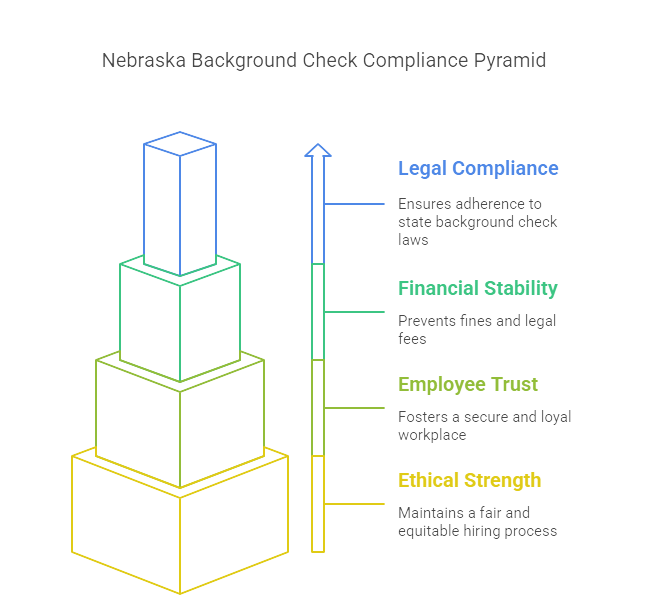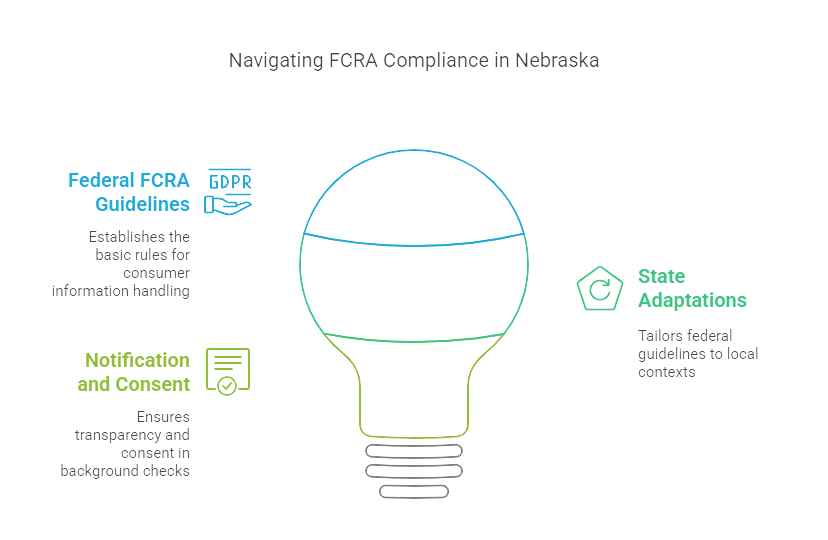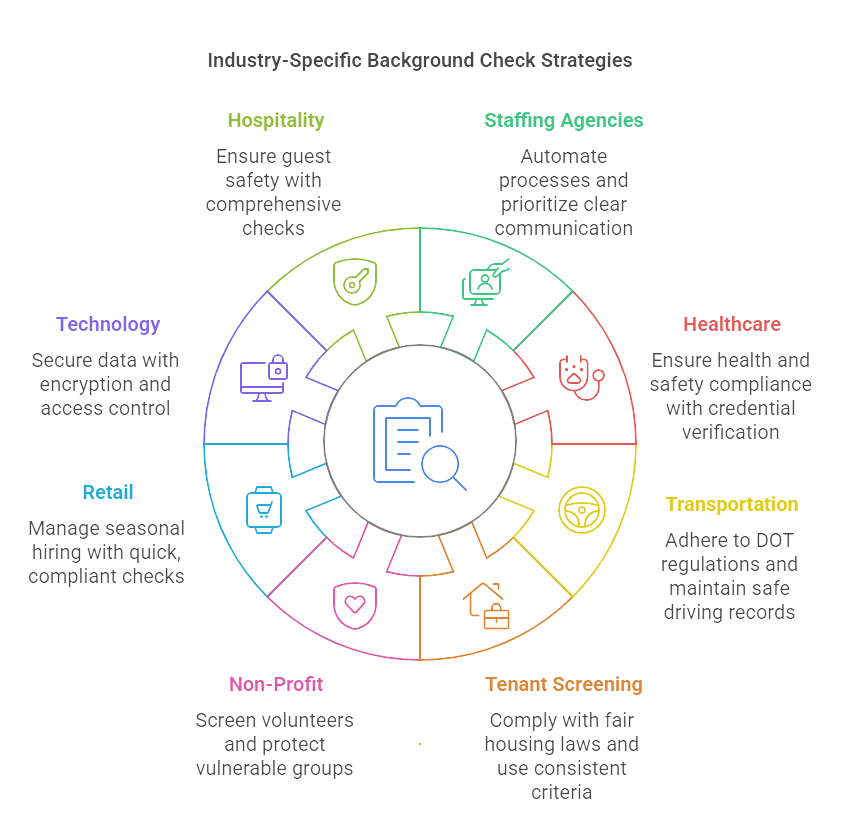Navigating the complexities of employment screening can be challenging for any HR professional. Understanding Nebraska's unique background check laws is crucial for compliance and effective hiring. This guide aims to provide business owners, HR professionals, recruiters, and job seekers with comprehensive insights into Nebraska's background check laws, tailored to various industries, including Staffing Agencies, Healthcare, Transportation, Tenant Screening, Non-profit, Retail, Technology, and Hospitality.
Key Takeaways
- Compliance with Nebraska’s background check laws is crucial for avoiding legal repercussions and fostering an equitable hiring process.
- Nebraska’s "Ban-the-Box" legislation restricts when employers can inquire about an applicant’s criminal history, promoting fair employment opportunities.
- Adhering to the Fair Credit Reporting Act (FCRA) requires applicants to give explicit consent and clear communication about the background check process.
- Industry-specific considerations, such as stringent checks for healthcare and tailored processes for retail, highlight the need for customized screening approaches.
- Regular training, meticulous record-keeping, and proactive internal audits ensure ongoing compliance and preparedness for legal reviews.
Introduction
Navigating Nebraska's background check laws is crucial for employers, HR professionals, and recruiters working within the state. These laws play a significant role in ensuring that hiring practices are both fair and legally compliant. Understanding these regulations helps protect companies from potential legal risks while fostering a transparent and trustworthy work environment.
Nebraska's specific legal landscape includes various regulations, such as the "Ban-the-Box" law, which impacts how employers can inquire about an applicant's criminal history. Additionally, industry-specific requirements may further dictate the depth and scope of background checks, making it essential for businesses to stay informed about these rules.
This guide aims to provide a comprehensive overview of Nebraska’s background check laws, offering practical advice for navigating the complexities of employment screening. By staying compliant with state regulations, employers can make informed hiring decisions that support both the company's integrity and the rights of potential employees.
EXPERT INSIGHT: As an HR professional who's walked the tightrope between compliance and compassion, I've seen firsthand how background check can spark thought-provoking questions —not just among job candidates, but employers trying to do good as well. Each background check is a human experience. The real power of background screening is in striking the balance between legal rigor and compassion—in still providing safety and integrity knowing that what's happened in someone's history doesn’t necessarily decide what they can be today. - Charm Paz, CHRP
Importance of Nebraska Background Check Laws
Let's be straightforward: compliance with Nebraska’s background check laws isn’t optional—it’s essential. Here’s why:
Why Compliance Matters
First off, these laws are designed to create a fair and balanced hiring process. They ensure that every candidate has a shot at employment without unfair bias. When you're compliant, you're not just following the law but fostering an equitable workplace. That’s good for your company's culture and its reputation.
Legal Ramifications
The repercussions of ignoring these laws can be steep. Non-compliance could put your company in hot water with fines and legal actions. Worse, it can damage your brand irreparably. No one wants to end up on the wrong side of a lawsuit for something as preventable as a background check compliance issue.
Financial Consequences
Failure to comply could also lead to financial tolls beyond fines, such as lowered productivity due to bad hires, increased turnover, and extensive legal fees. Straight compliance saves time, money, and a major headache.
Employee Trust and Safety
Lastly, adhering to these guidelines builds trust with your employees. They know you’re on the up-and-up, fostering a sense of security and loyalty. After all, a compliant workplace is a safer, happier workplace.
In sum, following Nebraska’s background check laws keeps your company legally safe, financially sound, and ethically strong.

State-Specific Regulations
Nebraska Employment Screening
Navigating the nuances of background check laws in Nebraska requires a clear understanding of the regulatory landscape. Nebraska mandates specific guidelines that employers must follow when conducting employment screenings. For instance, employers must be mindful of the balance between acquiring necessary information and respecting an applicant’s privacy. Employment screening in Nebraska often includes reviewing criminal records, credit history, and educational verification, but it must be conducted within the legal framework established by state law.
Ban-the-Box Legislation
Nebraska has implemented "Ban-the-Box" legislation, which is pivotal in how employers approach the hiring process. Specifically, this law restricts when employers can inquire about an applicant’s criminal history. Under this legislation prohibits employers from asking about criminal history on initial job applications. The intent is to provide individuals with a criminal record a fairer chance at securing employment by allowing them to be evaluated based on their qualifications first. Only after an applicant has been determined as a viable candidate based on merit can the employer delve into their criminal background.
Public Versus Private Employers
The background check requirements can differ significantly between Nebraska's public and private sectors. Public employers often have more stringent regulations, especially in positions involving safety, security, or vulnerable populations. These roles might require thorough screenings, including fingerprint-based background checks, processed through state law enforcement agencies. On the other hand, private employers are somewhat more flexible but must still adhere to state laws, ensuring they do not violate fair hiring principles. Both public and private entities must comply with the "Ban-the-Box" law and ensure their background checks are not discriminatory.
Additional Research: Nebraska employers must comply with state laws regulating background checks, including the ban-the-box and Workplace Privacy Act. This study provides an overview of Nebraska's employment background check laws, including the ban-the-box law and other regulations. See Nebraska Employment Background Check Laws.
Nebraska’s employment screening regulations underscore the importance of compliance and due diligence. Employers must stay informed and meticulous in their hiring practices to protect themselves from legal repercussions while fostering an inclusive and fair hiring environment.
Nebraska Fair Credit Reporting Act (FCRA) Compliance
Overview of the FCRA
The Fair Credit Reporting Act (FCRA) is a federal law that governs how consumer information is collected and used. For HR departments, this means the FCRA sets the standards for how background checks are conducted. As outlined in federal guidelines, the FCRA requires employers to get written consent from applicants before initiating a background check and mandates that applicants be informed if any adverse actions are taken based on the results.
State Adaptations
While the FCRA provides a federal framework, each state can adapt and implement these guidelines to suit their local context. In Nebraska, for example, state regulations stipulate how long criminal convictions can be reported and what types of credit checks are permissible. Employers must stay updated on these local adaptations to ensure they're not inadvertently breaching state-specific provisions while complying with the FCRA.
Notification and Consent
Under Nebraska law, as the FCRA mandates, employers must follow strict protocols for notifying candidates about background checks. This involves a clear, standalone disclosure form that informs the applicant that a background check will be performed. Explicit, written consent from the applicant is required before pulling any background report. Should a background check reveal information that could negatively impact the hiring decision, employers must provide the candidate with a pre-adverse action notice, a copy of the consumer report, and a summary of their rights under the FCRA. More detailed guidelines can be found at FCRA Compliance.

Key Elements of Nebraska Background Checks
Criminal History Checks
Criminal history checks in Nebraska come with their own set of specific procedures and limitations. For one, the "Ban-the-Box" legislation restricts employers from inquiring about an applicant’s criminal past. You can only probe into criminal history after making a conditional job offer. That said, once the green light is given, employers must follow clear guidelines for accessing and using this information. Employers should focus on convictions rather than arrests and consider the relevance of the criminal record to the job role.
Credit Checks
When it comes to credit checks, Nebraska employers need to tread carefully. Unlike states with restrictive laws around credit history as part of employment screening, Nebraska does not have specific restrictions beyond federal guidelines. The Fair Credit Reporting Act (FCRA) plays a significant role here, requiring explicit consent from the applicant before conducting a credit check. Be strategic—limit credit checks to roles where financial responsibilities or access to sensitive information make it truly necessary.
Driving Records
Driving records are particularly crucial if you're hiring for roles in transportation. In Nebraska, obtaining and evaluating an applicant’s Motor Vehicle Record (MVR) is essential for ensuring they meet safety and compliance standards. The state's DMV can provide detailed driving records to employers, covering aspects such as traffic violations, DUIs, and license suspensions. Ensure you use this information responsibly and comply with state and federal transportation laws.
Employment and Education Verification
Verifying an applicant’s employment and education history forms the backbone of any robust background check. In Nebraska, you’ll follow standard procedures similar to those in other states. Contact previous employers to confirm job titles, duties, and employment durations. For educational background, reach out to the institutions listed to verify degrees or certifications claimed by the applicant. While this step can be time-consuming, ensuring the candidate’s qualifications align with the job requirements is fundamentally important.
Industry-Specific Considerations
Staffing Agencies
Hiring is a high-stakes game, but the ante is upped with volumes that can quickly become overwhelming for staffing agencies. Managing these high volumes efficiently without sacrificing compliance is critical. Here’s how to play it smart:
Automate Where Possible
Utilize automated systems to handle the repetitive aspects of background checks. Automation can dramatically reduce the time spent on individual screenings and minimize human error.
Prioritize Clear Communication
Transparency should be a part of your process. Clearly inform candidates about the background check steps and timelines. This preemptively addresses any common anxieties and questions they might have, ensuring a smoother experience for all parties involved.
Vendor Partnerships
Forge partnerships with reputable background check vendors. They can provide specialized services and handle bulk screenings more adeptly, offering scalability without compromising speed or accuracy.
Streamline the Consent Process
Digital consent forms can expedite the initial authorization phase. Ensure these forms are mobile-friendly to cater to candidates applying on the go.
Customized Packages
Not all positions require the same level of scrutiny. Develop tiered background check packages tailored to different job levels and requirements. This approach optimizes resources and speeds up the hiring process for roles that don’t necessitate exhaustive checks.
Regular Training
Equip your team with the latest knowledge in compliance and best practices. Regular training sessions ensure that everyone is up-to-date, reducing non-compliance risk and potential legal issues.
Quick Turnaround Time
Leverage technology and vendor expertise to aim for background check completions within 24 to 48 hours. Speed is crucial in the staffing world, and a quick turnaround time can keep you competitive.
By adopting these strategies, staffing agencies can navigate the background check process more efficiently, ensuring both compliance and speed. This safeguards your agency and bolsters your reputation as a reliable partner for clients and candidates.
Healthcare
Health and safety are paramount in the healthcare industry, making stringent background checks indispensable. Nebraska's laws underscore the importance of thorough vetting processes to ensure that healthcare professionals possess the appropriate qualifications and meet the state's rigorous standards for patient care and safety.
Health and Safety Compliance: In Nebraska, healthcare employers must adhere to robust health and safety regulations when conducting background checks. This often involves an in-depth review of an applicant’s criminal history to screen out those convicted of violent crimes or offenses related to patient abuse or neglect. Additionally, healthcare professionals are often subject to periodic re-checks throughout their tenure to maintain compliance with state health regulations.
Credential Verification: Verifying professional licenses and certifications is crucial in the hiring process for healthcare positions. Nebraska requires healthcare employers to validate that all credentials are current and issued by accredited institutions. This includes licenses from physicians, nurses, pharmacists, and other healthcare practitioners. The Nebraska Department of Health and Human Services (DHHS) offers resources and databases that employers can use to verify these professional credentials accurately and promptly.
In sum, the significance of comprehensive background checks and proper credential verification cannot be overstated in Nebraska’s healthcare sector. By adhering to state regulations and conducting meticulous screenings, employers can protect patient safety, uphold their organization’s integrity, and ensure compliance with the law.
Transportation
Background checks carry an added layer of responsibility and regulation in the transportation industry. Employers must pay particular attention to state-specific and federal guidelines to ensure the safety and reliability of their workforce.
DOT Regulations
The Department of Transportation (DOT) has stringent regulations for transportation employers, especially those involved in interstate commerce. In Nebraska, these regulations are strictly enforced to maintain high safety standards on the road. Employers must conduct comprehensive background checks that include evaluating driving records, criminal history, and previous employment in the transportation industry.
It's not enough to follow Nebraska state laws; transportation employers must also align with DOT requirements to avoid hefty fines and potential legal consequences. This involves thorough pre-employment screenings and periodic evaluations to ensure ongoing compliance. Failing to adhere to these standards can lead to severe legal and financial repercussions, along with increased liability in the event of an accident involving one of their drivers.
Safe Driving Records
An impeccable driving record is non-negotiable in the transportation sector. Safe driving cannot be overstated—it is a fundamental element for operational success and public safety. Employers should meticulously review applicant driving records for any history of violations, suspensions, or accidents. This information is crucial not just for compliance, but also for maintaining the company’s reputation and safeguarding road users.
Moreover, transportation companies must implement ongoing monitoring programs that regularly check the driving status of current employees. This proactive approach helps in identifying potential risks before they translate into real-world incidents.
In conclusion, Nebraska transportation employers must comply with state and DOT regulations and prioritize the thorough evaluation of driving records. By doing so, they ensure legal compliance, operational efficiency, and most importantly, public safety.
Tenant Screening
Tenant screening in Nebraska adheres to both state and federal guidelines designed to ensure fair and lawful evaluation of potential tenants. It's critical for landlords and property managers to understand these laws to prevent discrimination and foster a fair housing environment.
Applicable Laws
In Nebraska, tenant screening must comply with the Nebraska Uniform Residential Landlord and Tenant Act (NURLTA). This includes considerations for conducting background checks and the permissible use of information obtained during such screenings. Importantly, landlords must ensure accuracy and fairness, refraining from using outdated or incorrect data to make leasing decisions.
Fair Housing Considerations
To remain compliant with the Fair Housing Act (FHA), landlords and property managers must avoid discriminatory practices based on race, color, national origin, religion, sex, familial status, or disability. This means consistent screening criteria must be applied to every applicant to ensure fairness and avoid legal repercussions.
Steps for Compliance
- Consistent Criteria: Establish and document a standard set of criteria used in the screening process for all applicants. This helps ensure that all applicants are judged by the same standards, reducing the risk of discrimination claims.
- Disclosure and Consent: Before conducting a background check, landlords must provide a clear disclosure to the applicant and obtain their written consent. This practice not only aligns with the Fair Credit Reporting Act (FCRA) requirements but also promotes transparency.
- Use of Criminal History: While landlords can consider an applicant’s criminal history, it’s crucial to focus on recent and relevant offenses. For instance, criminal convictions should be weighed more heavily than mere arrests. Additionally, landlords should consider the nature and severity of the offense, as well as the time elapsed since it occurred.
- Credit Checks: Nebraska law permits credit checks as part of tenant screening. However, landlords must be cautious in using this information. An adverse action based on credit history necessitates providing the applicant with an adverse action notice, explaining the reasons and their rights under FCRA.
- Handling Application Information: Sensitive data obtained during background checks must be securely stored and ultimately disposed of in a manner that prevents unauthorized access, ensuring compliance with both state and federal privacy regulations.
By adhering to these guidelines, landlords in Nebraska can conduct thorough and fair tenant screenings, ensuring compliance with applicable laws while fostering a non-discriminatory rental market. This not only helps in selecting trustworthy tenants but also builds a reputation for equitable and ethical property management practices.
Non-Profit
When it comes to non-profit organizations, background checks are as critical as they are in any other sector and slightly more nuanced. Unlike for-profit sectors where the primary concern might be financial stability or technical skills, non-profits often prioritize trustworthiness, reliability, and a genuine commitment to the cause. Here are some unique considerations for background checks on volunteers and non-profit employees in Nebraska:
Volunteer Screening
Given that volunteers form the backbone of many non-profits, conducting thorough background checks consistent with state laws and organizational policies is essential. Nebraska law permits non-profits to vet their volunteers' criminal histories; however, the "Ban-the-Box" legislation must be adhered to, which delays the inquiry about criminal records until after the initial application stage. This ensures you give everyone a fair chance while safeguarding the organization and its beneficiaries.
FCRA Compliance
Even for volunteers, non-profits must comply with the Fair Credit Reporting Act (FCRA) when conducting background checks. This involves providing a clear disclosure, securing written consent from the individual, and notifying them if information from the report leads to a decision against their engagement.
Child and Elderly Protection
If your non-profit offers services to vulnerable groups such as children or the elderly, state regulations may require more stringent checks. In Nebraska, this means you might need to carry out detailed criminal history checks to screen for past incidents of abuse or neglect. These checks should be a standard part of your volunteer onboarding process.
Credential and Past Experience Verification
Verifying educational credentials and past work experience is crucial for positions requiring specific qualifications. This ensures that volunteers and employees are adequately equipped with the necessary skills and integrity to handle their responsibilities effectively.
Privacy Concerns
Respect and confidentiality are paramount, not just legally but also ethically. Non-profits often operate on trust and community goodwill. Ensure all sensitive information gathered during the background check process is securely stored and accessible only to authorized personnel.
In summary, while non-profit organizations face unique challenges in their operations, adhering to Nebraska's background check laws is essential. Conducting comprehensive and compliant background checks helps mitigate risk, protect vulnerable populations, and build a solid community trust foundation.
Retail
Seasonal Hiring
In the fast-paced world of retail, seasonal hiring often becomes necessary to keep up with the surge in customer demand during holidays and special sales events. The challenge, however, lies in balancing quick onboarding with thorough, compliant background checks.
Strategies for Quick Yet Compliant Screening
- Pre-Planned Hiring Campaigns: Start your recruitment plans early. By anticipating your seasonal workforce needs, you can begin the background check process well before the peak season hits. This proactive approach ensures you're not caught off-guard and scrambling for retail staff at the eleventh hour.
- Bulk Screening Services: Leverage background check services that specialize in handling large volumes of applicants. Some providers offer batch processing options designed to expedite the screening of multiple candidates simultaneously. This can significantly reduce the time taken from application to employment.
- Tiered Background Checks: Implement a tiered system where the depth of the background check varies by the role's responsibilities. For instance, a temporary stock clerk may not require as in-depth a check as a temporary cashier who handles cash transactions. Make sure the tiered approach still adheres to Nebraska’s legal requirements.
- Temporary Employee Database: Maintain a database of past seasonal employees who have successfully passed their background checks. When the seasonal rush comes, reaching out to these previously vetted individuals can save time.
- Clear Communication: Ensure all applicants are aware of the background check process and any documents they must provide beforehand. Clear communication reduces delays caused by missing information and keeps the candidates informed about their progress, fostering a sense of transparency and fairness.
- Outsourcing: Consider partnering with specialized staffing agencies. These agencies often have streamlined processes for vetting candidates, allowing your HR department to focus more on strategic tasks rather than getting bogged down in operational details.
By implementing these strategies, retailers can efficiently manage the influx of seasonal hires while remaining compliant with Nebraska's background check laws. This balance ensures that retail businesses are staffed with trustworthy employees, ready to meet customer needs during the busiest times of the year.
Technology
In the technology industry, safeguarding data is more than just a best practice—it's an absolute necessity. When handling sensitive information during background checks, HR departments must adhere to stringent data security measures to comply with Nebraska state laws and overarching industry standards.
Encryption is key. All data collected during background checks, from personal identification to criminal history and employment records, should be encrypted in transit and at rest. This ensures that sensitive information remains confidential and secure from unauthorized access or cyber threats.
Next, access control measures must be implemented rigorously. Only authorized personnel should have access to background check data, and this access should be audited regularly. Role-based access control (RBAC) can help manage who can view or edit this sensitive data depending on their role within the organization.
Moreover, compliance with federal laws such as the General Data Protection Regulation (GDPR) and the California Consumer Privacy Act (CCPA), although not specific to Nebraska, can set a high standard for data security practices. These regulations emphasize the importance of data subject rights, including the right to access, correct, or delete personal information, which can be beneficial in shaping a comprehensive data security strategy.
HR departments must also establish robust data retention policies. Only retain background check information for as long as it is necessary for business purposes or compliance needs. Once this period ends, secure data destruction methods should ensure the information cannot be reconstructed or retrieved.
Hospitality
Ensuring guest safety in the hospitality industry is non-negotiable—an absolute must. In Nebraska, this means implementing rigorous background check protocols for all potential hires. Unlike some other sectors, hospitality deals directly with the public in a more intimate way, necessitating heightened vigilance.
Firstly, identify positions that will have direct contact with guests, such as front desk staff, housekeepers, and security personnel. For these roles, it's especially crucial to conduct comprehensive criminal history checks. You're not just looking at state databases; it’s wise to tap into national criminal databases as well. Given the transient nature of many hospitality employees, localized checks might miss crucial information about out-of-state offenses.
Credit checks can also be an important tool, particularly for managerial positions or roles that involve handling financial transactions. Nebraska employers need to secure explicit consent from applicants before pulling credit reports, as per the Fair Credit Reporting Act. This not only keeps you compliant but also builds transparency and trust from the get-go.
Verification of previous employment is another critical step. Nebraska's employment background check laws do not obstruct employers from verifying past positions held by applicants. However, be systematic in how you approach this. Validate dates of employment, roles, and responsibilities. This helps filter out embellishments and ensures you’re hiring someone genuinely qualified.
Lastly, consider adding education verification to the mix, especially for roles requiring specialized skills or professional training. Past academic misconduct can be a red flag, indicating potential ethical lapses.
In summary, a thorough background check process in hospitality not only upholds Nebraska’s regulations but more importantly, creates a safer haven for your guests. It’s peace of mind for you and those you serve, ensuring that every check-in starts and ends with trust.

Nebraska Background Check Resources
| Website Name | URL | Description |
|---|---|---|
| Department of Labor (Nebraska) | dol.nebraska.gov | Provides resources on labor laws, employer requirements, and workplace safety. |
| Nebraska State Patrol | statepatrol.nebraska.gov | Offers criminal history checks and background screening services. |
| Department of Transportation (Nebraska) | dot.nebraska.gov | Manages driver records and safety regulations crucial for employee background checks. |
| Nebraska Equal Opportunity Commission | neoc.nebraska.gov | Enforces anti-discrimination laws in employment, including background check compliance. |
| Secretary of State (Nebraska) | sos.nebraska.gov | Provides business registration and compliance information for employers. |
EEOC Guidelines and Considerations
The Equal Employment Opportunity Commission (EEOC) sets forth guidelines to prevent discrimination in the hiring process, including during background checks. Nebraska employers must adhere to these federal anti-discrimination laws while ensuring compliance with state-specific regulations.
Anti-Discrimination Laws
Nebraska employers conducting background checks must comply with Title VII of the Civil Rights Act, which prohibits employment discrimination based on race, color, religion, sex, or national origin. When obtaining and using background check information, it’s crucial to apply the same standards and procedures to all applicants to avoid disparate treatment or impact.
Best Practices
Here are a few best practices for Nebraska employers to align with EEOC guidelines and avoid discriminatory practices:
- Consistent Procedures: Establish a clear, consistent background check process that applies uniformly to all candidates for similar positions.
- Job Relevance: Ensure that the information gathered during background checks is relevant to the job in question. For instance, a driving record might be pertinent for positions requiring vehicle operation but not for a desk job.
- Individualized Assessments: When a background check reveals potentially harmful information, conduct an individualized assessment before hiring. Consider the nature and severity of the offense, the time elapsed since the occurrence, and its relevance to the job.
- Document Decisions: Thoroughly document the decision-making process to demonstrate compliance with EEOC guidelines and Nebraska state laws.
- Transparency: Be transparent with applicants about the background check process, including how the information will be used and the check duration. Providing clear instructions and maintaining open communication can help foster trust.
- Training: Train HR staff and hiring managers on EEOC guidelines and Nebraska-specific background check laws to ensure fair and compliant hiring practices.
- Adverse Action Process: If a decision is made not to hire based on background check information, follow the adverse action process as outlined by the FCRA. This includes providing pre-adverse action notices, allowing candidates time to respond, and sending a final adverse action notice if the decision remains.
For more detailed guidance and resources, refer to the EEOC's official guidelines on background checks and stay updated with any changes in legislation to ensure your hiring procedures remain compliant with both federal and state laws.
Preparing for Audits and Legal Reviews
Documentation and record-keeping are your best defense when preparing for audits and legal reviews. It's not just about dotting the i’s and crossing the t’s—it’s about having a robust system that can withstand scrutiny.
Documentation and Record Keeping
First things first, you'll need to maintain detailed records of every background check you conduct. This includes not just the reports themselves but also the consent and notification forms that are documented. Each step of the process needs to be traceable. An organized digital or physical filing system can make a world of difference. Make sure every record is timestamped and easily accessible.
If you’re dealing with different types of background checks—like criminal history, driving records, or employment verification—create separate folders or databases for each category. This clarity will not only help during an audit but also streamline your internal processes. Remember, Nebraska laws mandate retaining these documents for specific durations, so keep up-to-date with those timelines.
Compliance Audits
When it comes to preparing for compliance audits, a proactive approach is your best bet. Regularly scheduled internal audits can help catch inconsistencies or potential compliance issues before they become real problems. Establish a checklist based on Nebraska's background check laws and review each file against this list.
Engage your legal team or consult with an external compliance expert to conduct a mock audit. This exercise can identify any gaps in your current processes and give you a clear roadmap for rectification. Also, consider leveraging audit management software that can help you stay organized and conduct thorough reviews efficiently.
Whether it’s ensuring that all consents are properly documented or verifying that adverse action notices are compliant, every small detail counts. Being prepared with a comprehensive audit trail can make the difference between a smooth audit and a potential legal nightmare.
In summary, meticulous record-keeping and periodic internal compliance checks are essential for any HR department to remain audit-ready. By adhering to these best practices, you'll be well-equipped to handle any scrutiny that comes your way, keeping your organization compliant and risk-free.

Resources and Assistance
Navigating Nebraska's background check laws can be daunting, but several resources are available to help simplify the process. First, consider joining professional organizations like the Professional Background Screening Association (PBSA) and the Society for Human Resource Management (SHRM). Membership in these organizations provides access to a wealth of up-to-date information, industry best practices, webinars, and networking opportunities with other HR professionals.
When legal complexities arise, it's crucial to seek expert advice. Consulting with a legal advisor familiar with Nebraska's specific regulations can offer personalized guidance and help you avoid costly missteps. Their expertise is invaluable, especially for nuanced cases where compliance is less straightforward.
Additionally, the Equal Employment Opportunity Commission (EEOC) provides comprehensive resources for employers. Their guidelines can help ensure your practices are non-discriminatory and in line with federal laws. Leveraging these resources will better equip your HR department to conduct thorough, compliant background checks.
Understanding and complying with Nebraska background check laws is vital to hiring. By adhering to state-specific regulations and industry standards, employers can mitigate risk, ensure a safe workplace, and make informed hiring decisions. For HR professionals and recruiters, being well-versed in these laws promotes compliance and fosters trust and transparency in the recruitment process.
This guide aims to be an indispensable resource for navigating the complexities of Nebraska's background check laws, ensuring legal compliance, and promoting ethical hiring practices across various industries.

GCheck Editorial Team
Meet the GCheck Editorial Team, your trusted source for insightful and up-to-date information in the world of employment background checks. Committed to delivering the latest trends, best practices, and industry insights, our team is dedicated to keeping you informed.
With a passion for ensuring accuracy, compliance, and efficiency in background screening, we are your go-to experts in the field. Stay tuned for our comprehensive articles, guides, and analysis, designed to empower businesses and individuals with the knowledge they need to make informed decisions.
At GCheck, we're here to guide you through the complexities of background checks, every step of the way.






